Orientation for Success: Reflective Learning Essay (2022-2023)
VerifiedAdded on 2023/06/11
|11
|2018
|125
Essay
AI Summary
This essay examines the crucial role of reflective learning in higher education, emphasizing the application of the Gibbs model for self-assessment and improvement. It delves into the significance of feedback and feedforward mechanisms in enhancing student learning and academic performance. The essay highlights the importance of these approaches in fostering a dynamic and career-oriented educational environment. It also covers key concepts like formative and summative assessments, and the implementation of feedback for continuous improvement, concluding that reflective practices and constructive feedback are essential for students' overall development and success in higher education. The essay also touches on the importance of ethical practices, including avoiding plagiarism, and the role of institutions in supporting student success.
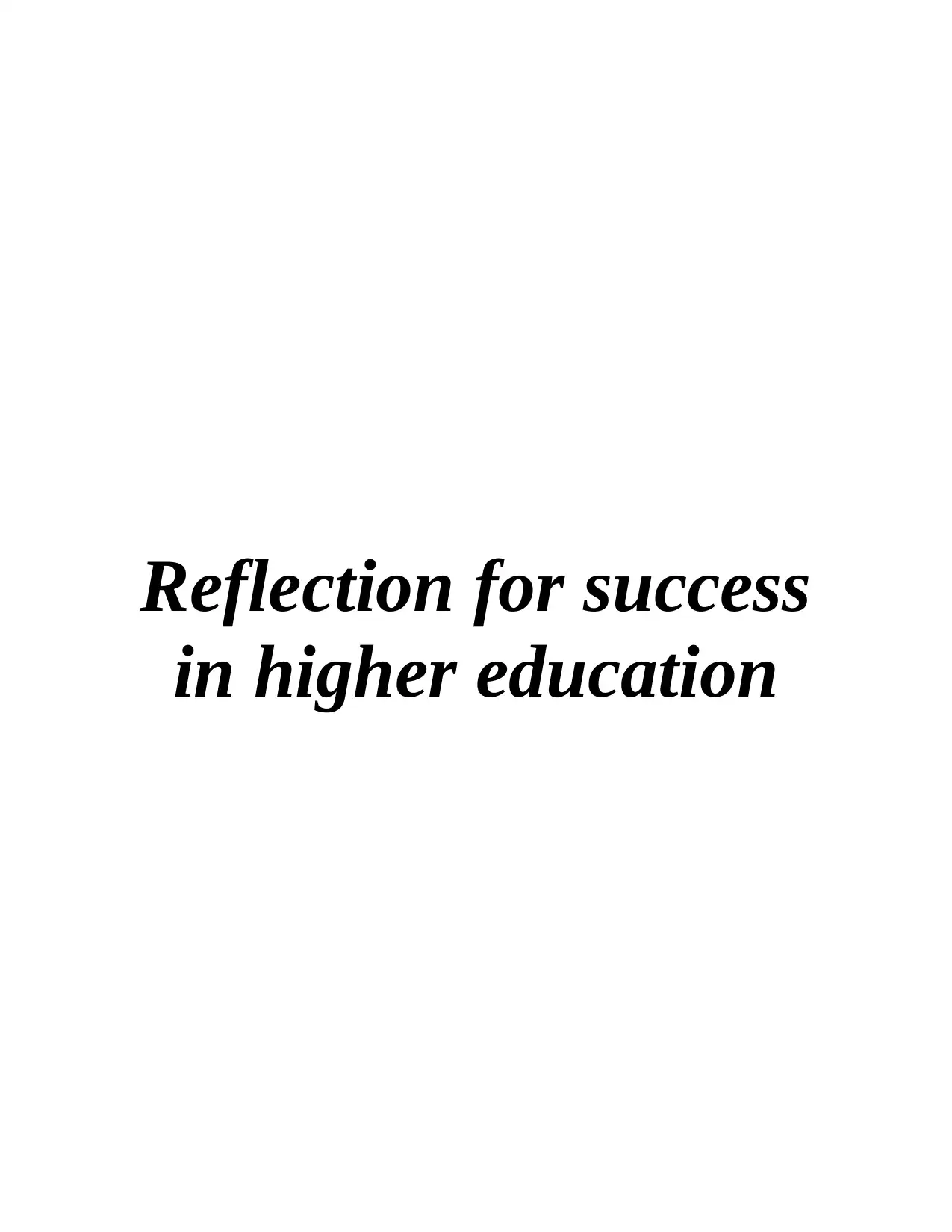
Reflection for success
in higher education
in higher education
Paraphrase This Document
Need a fresh take? Get an instant paraphrase of this document with our AI Paraphraser
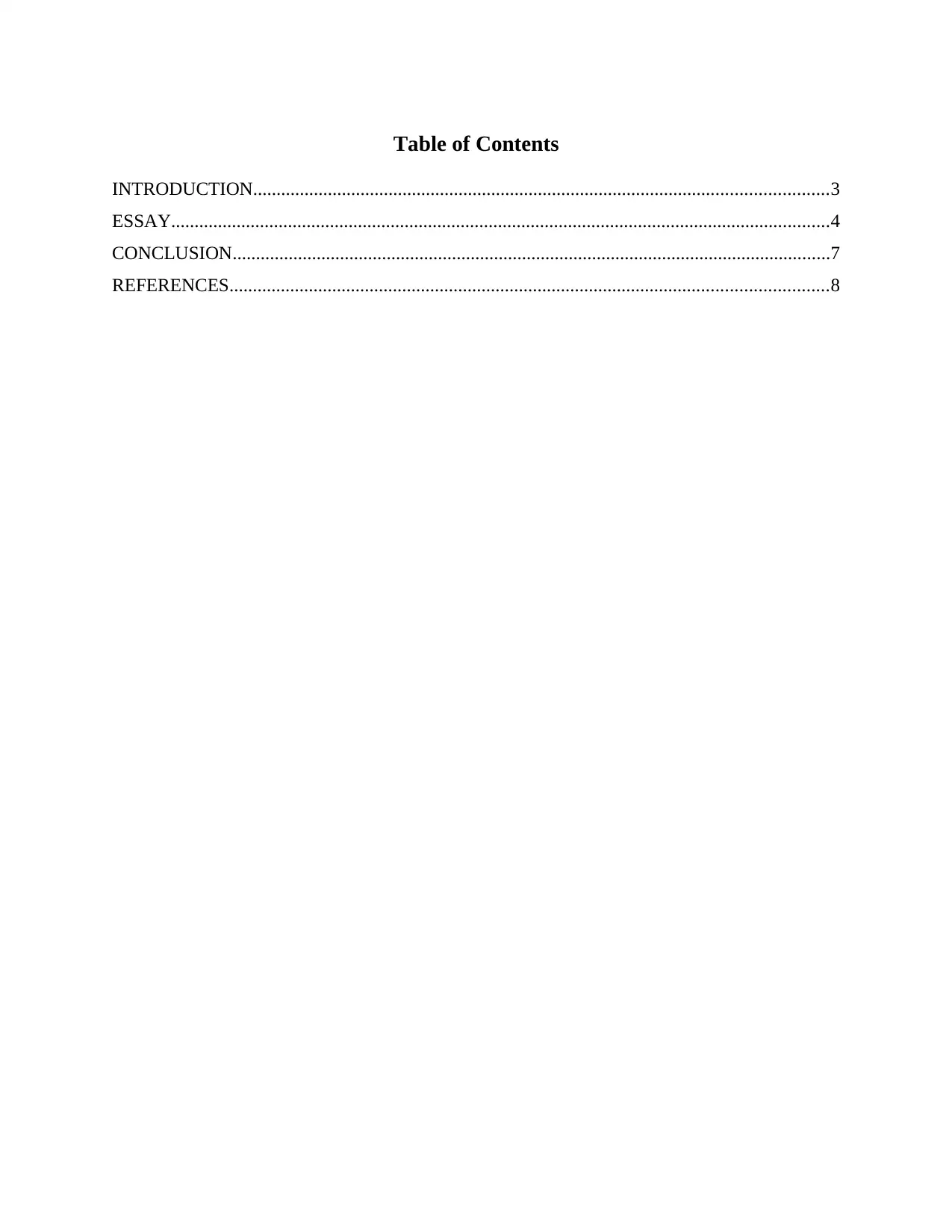
Table of Contents
INTRODUCTION...........................................................................................................................3
ESSAY.............................................................................................................................................4
CONCLUSION................................................................................................................................7
REFERENCES................................................................................................................................8
INTRODUCTION...........................................................................................................................3
ESSAY.............................................................................................................................................4
CONCLUSION................................................................................................................................7
REFERENCES................................................................................................................................8
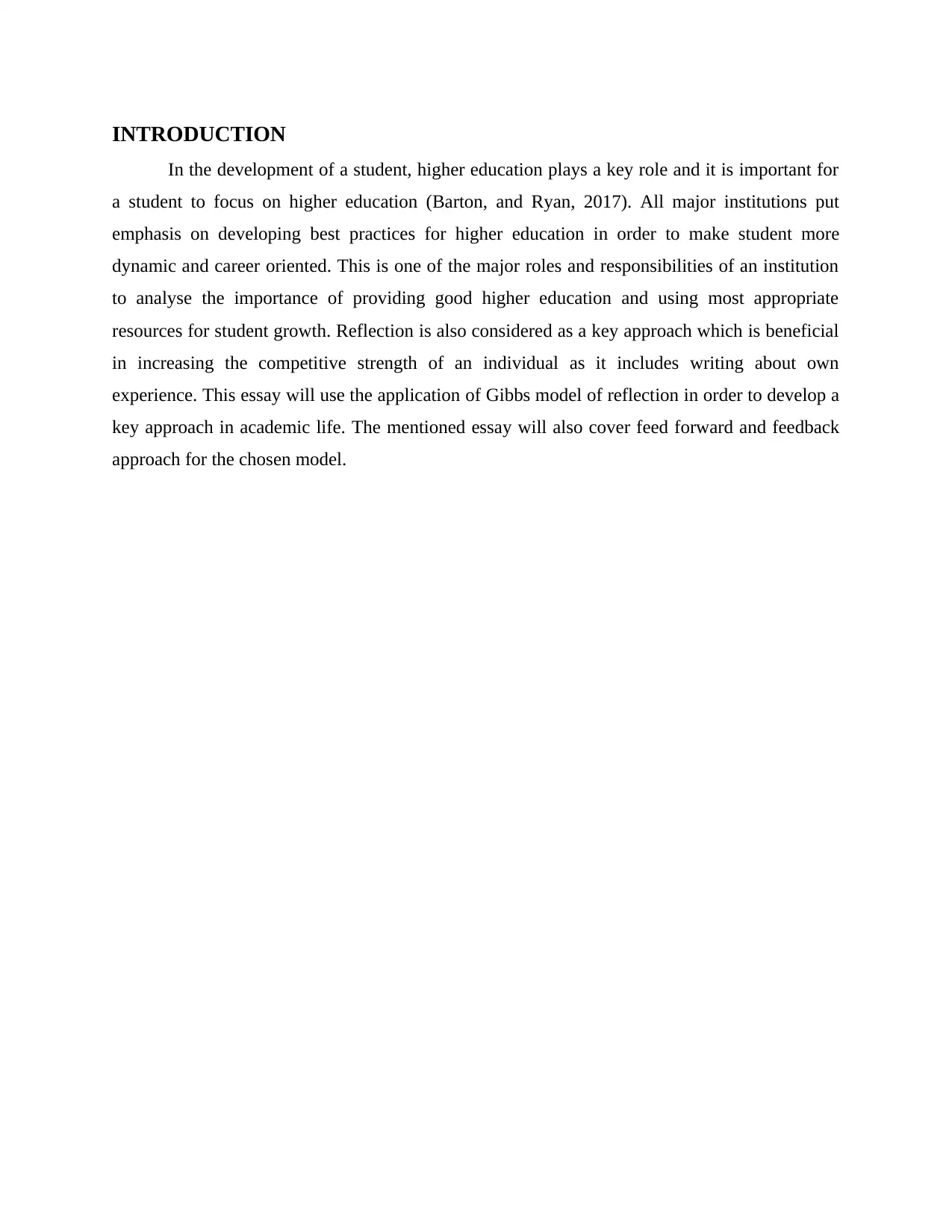
INTRODUCTION
In the development of a student, higher education plays a key role and it is important for
a student to focus on higher education (Barton, and Ryan, 2017). All major institutions put
emphasis on developing best practices for higher education in order to make student more
dynamic and career oriented. This is one of the major roles and responsibilities of an institution
to analyse the importance of providing good higher education and using most appropriate
resources for student growth. Reflection is also considered as a key approach which is beneficial
in increasing the competitive strength of an individual as it includes writing about own
experience. This essay will use the application of Gibbs model of reflection in order to develop a
key approach in academic life. The mentioned essay will also cover feed forward and feedback
approach for the chosen model.
In the development of a student, higher education plays a key role and it is important for
a student to focus on higher education (Barton, and Ryan, 2017). All major institutions put
emphasis on developing best practices for higher education in order to make student more
dynamic and career oriented. This is one of the major roles and responsibilities of an institution
to analyse the importance of providing good higher education and using most appropriate
resources for student growth. Reflection is also considered as a key approach which is beneficial
in increasing the competitive strength of an individual as it includes writing about own
experience. This essay will use the application of Gibbs model of reflection in order to develop a
key approach in academic life. The mentioned essay will also cover feed forward and feedback
approach for the chosen model.
⊘ This is a preview!⊘
Do you want full access?
Subscribe today to unlock all pages.

Trusted by 1+ million students worldwide
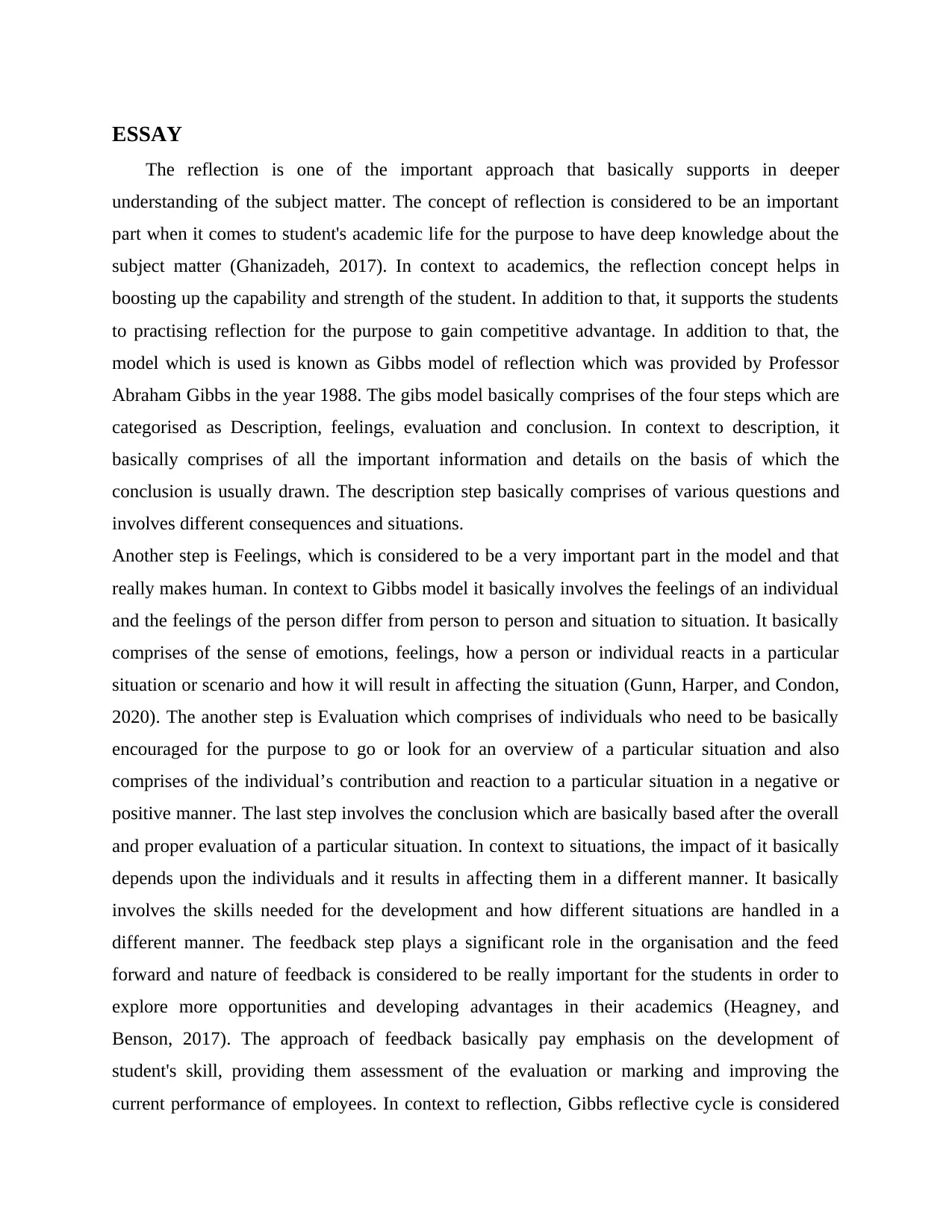
ESSAY
The reflection is one of the important approach that basically supports in deeper
understanding of the subject matter. The concept of reflection is considered to be an important
part when it comes to student's academic life for the purpose to have deep knowledge about the
subject matter (Ghanizadeh, 2017). In context to academics, the reflection concept helps in
boosting up the capability and strength of the student. In addition to that, it supports the students
to practising reflection for the purpose to gain competitive advantage. In addition to that, the
model which is used is known as Gibbs model of reflection which was provided by Professor
Abraham Gibbs in the year 1988. The gibs model basically comprises of the four steps which are
categorised as Description, feelings, evaluation and conclusion. In context to description, it
basically comprises of all the important information and details on the basis of which the
conclusion is usually drawn. The description step basically comprises of various questions and
involves different consequences and situations.
Another step is Feelings, which is considered to be a very important part in the model and that
really makes human. In context to Gibbs model it basically involves the feelings of an individual
and the feelings of the person differ from person to person and situation to situation. It basically
comprises of the sense of emotions, feelings, how a person or individual reacts in a particular
situation or scenario and how it will result in affecting the situation (Gunn, Harper, and Condon,
2020). The another step is Evaluation which comprises of individuals who need to be basically
encouraged for the purpose to go or look for an overview of a particular situation and also
comprises of the individual’s contribution and reaction to a particular situation in a negative or
positive manner. The last step involves the conclusion which are basically based after the overall
and proper evaluation of a particular situation. In context to situations, the impact of it basically
depends upon the individuals and it results in affecting them in a different manner. It basically
involves the skills needed for the development and how different situations are handled in a
different manner. The feedback step plays a significant role in the organisation and the feed
forward and nature of feedback is considered to be really important for the students in order to
explore more opportunities and developing advantages in their academics (Heagney, and
Benson, 2017). The approach of feedback basically pay emphasis on the development of
student's skill, providing them assessment of the evaluation or marking and improving the
current performance of employees. In context to reflection, Gibbs reflective cycle is considered
The reflection is one of the important approach that basically supports in deeper
understanding of the subject matter. The concept of reflection is considered to be an important
part when it comes to student's academic life for the purpose to have deep knowledge about the
subject matter (Ghanizadeh, 2017). In context to academics, the reflection concept helps in
boosting up the capability and strength of the student. In addition to that, it supports the students
to practising reflection for the purpose to gain competitive advantage. In addition to that, the
model which is used is known as Gibbs model of reflection which was provided by Professor
Abraham Gibbs in the year 1988. The gibs model basically comprises of the four steps which are
categorised as Description, feelings, evaluation and conclusion. In context to description, it
basically comprises of all the important information and details on the basis of which the
conclusion is usually drawn. The description step basically comprises of various questions and
involves different consequences and situations.
Another step is Feelings, which is considered to be a very important part in the model and that
really makes human. In context to Gibbs model it basically involves the feelings of an individual
and the feelings of the person differ from person to person and situation to situation. It basically
comprises of the sense of emotions, feelings, how a person or individual reacts in a particular
situation or scenario and how it will result in affecting the situation (Gunn, Harper, and Condon,
2020). The another step is Evaluation which comprises of individuals who need to be basically
encouraged for the purpose to go or look for an overview of a particular situation and also
comprises of the individual’s contribution and reaction to a particular situation in a negative or
positive manner. The last step involves the conclusion which are basically based after the overall
and proper evaluation of a particular situation. In context to situations, the impact of it basically
depends upon the individuals and it results in affecting them in a different manner. It basically
involves the skills needed for the development and how different situations are handled in a
different manner. The feedback step plays a significant role in the organisation and the feed
forward and nature of feedback is considered to be really important for the students in order to
explore more opportunities and developing advantages in their academics (Heagney, and
Benson, 2017). The approach of feedback basically pay emphasis on the development of
student's skill, providing them assessment of the evaluation or marking and improving the
current performance of employees. In context to reflection, Gibbs reflective cycle is considered
Paraphrase This Document
Need a fresh take? Get an instant paraphrase of this document with our AI Paraphraser
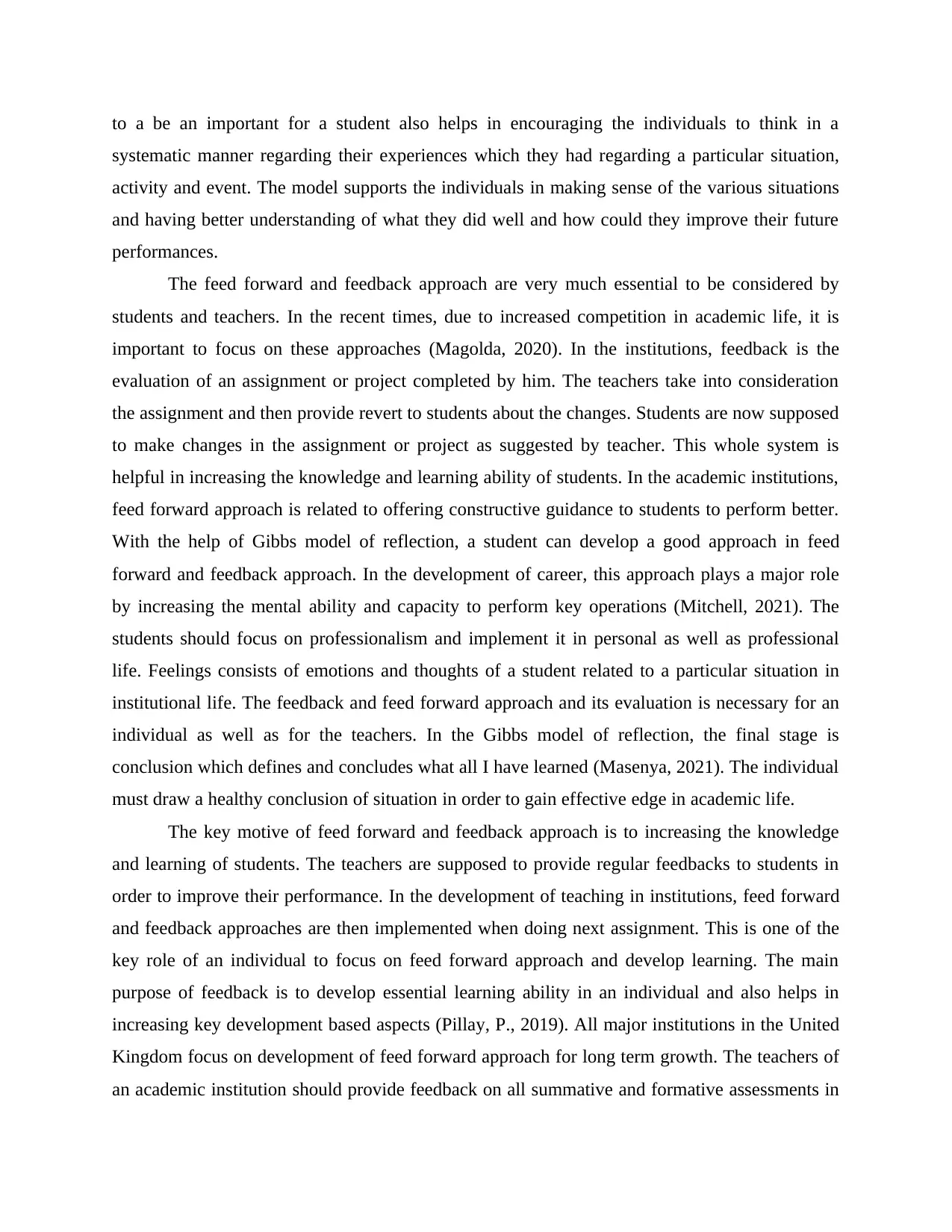
to a be an important for a student also helps in encouraging the individuals to think in a
systematic manner regarding their experiences which they had regarding a particular situation,
activity and event. The model supports the individuals in making sense of the various situations
and having better understanding of what they did well and how could they improve their future
performances.
The feed forward and feedback approach are very much essential to be considered by
students and teachers. In the recent times, due to increased competition in academic life, it is
important to focus on these approaches (Magolda, 2020). In the institutions, feedback is the
evaluation of an assignment or project completed by him. The teachers take into consideration
the assignment and then provide revert to students about the changes. Students are now supposed
to make changes in the assignment or project as suggested by teacher. This whole system is
helpful in increasing the knowledge and learning ability of students. In the academic institutions,
feed forward approach is related to offering constructive guidance to students to perform better.
With the help of Gibbs model of reflection, a student can develop a good approach in feed
forward and feedback approach. In the development of career, this approach plays a major role
by increasing the mental ability and capacity to perform key operations (Mitchell, 2021). The
students should focus on professionalism and implement it in personal as well as professional
life. Feelings consists of emotions and thoughts of a student related to a particular situation in
institutional life. The feedback and feed forward approach and its evaluation is necessary for an
individual as well as for the teachers. In the Gibbs model of reflection, the final stage is
conclusion which defines and concludes what all I have learned (Masenya, 2021). The individual
must draw a healthy conclusion of situation in order to gain effective edge in academic life.
The key motive of feed forward and feedback approach is to increasing the knowledge
and learning of students. The teachers are supposed to provide regular feedbacks to students in
order to improve their performance. In the development of teaching in institutions, feed forward
and feedback approaches are then implemented when doing next assignment. This is one of the
key role of an individual to focus on feed forward approach and develop learning. The main
purpose of feedback is to develop essential learning ability in an individual and also helps in
increasing key development based aspects (Pillay, P., 2019). All major institutions in the United
Kingdom focus on development of feed forward approach for long term growth. The teachers of
an academic institution should provide feedback on all summative and formative assessments in
systematic manner regarding their experiences which they had regarding a particular situation,
activity and event. The model supports the individuals in making sense of the various situations
and having better understanding of what they did well and how could they improve their future
performances.
The feed forward and feedback approach are very much essential to be considered by
students and teachers. In the recent times, due to increased competition in academic life, it is
important to focus on these approaches (Magolda, 2020). In the institutions, feedback is the
evaluation of an assignment or project completed by him. The teachers take into consideration
the assignment and then provide revert to students about the changes. Students are now supposed
to make changes in the assignment or project as suggested by teacher. This whole system is
helpful in increasing the knowledge and learning ability of students. In the academic institutions,
feed forward approach is related to offering constructive guidance to students to perform better.
With the help of Gibbs model of reflection, a student can develop a good approach in feed
forward and feedback approach. In the development of career, this approach plays a major role
by increasing the mental ability and capacity to perform key operations (Mitchell, 2021). The
students should focus on professionalism and implement it in personal as well as professional
life. Feelings consists of emotions and thoughts of a student related to a particular situation in
institutional life. The feedback and feed forward approach and its evaluation is necessary for an
individual as well as for the teachers. In the Gibbs model of reflection, the final stage is
conclusion which defines and concludes what all I have learned (Masenya, 2021). The individual
must draw a healthy conclusion of situation in order to gain effective edge in academic life.
The key motive of feed forward and feedback approach is to increasing the knowledge
and learning of students. The teachers are supposed to provide regular feedbacks to students in
order to improve their performance. In the development of teaching in institutions, feed forward
and feedback approaches are then implemented when doing next assignment. This is one of the
key role of an individual to focus on feed forward approach and develop learning. The main
purpose of feedback is to develop essential learning ability in an individual and also helps in
increasing key development based aspects (Pillay, P., 2019). All major institutions in the United
Kingdom focus on development of feed forward approach for long term growth. The teachers of
an academic institution should provide feedback on all summative and formative assessments in
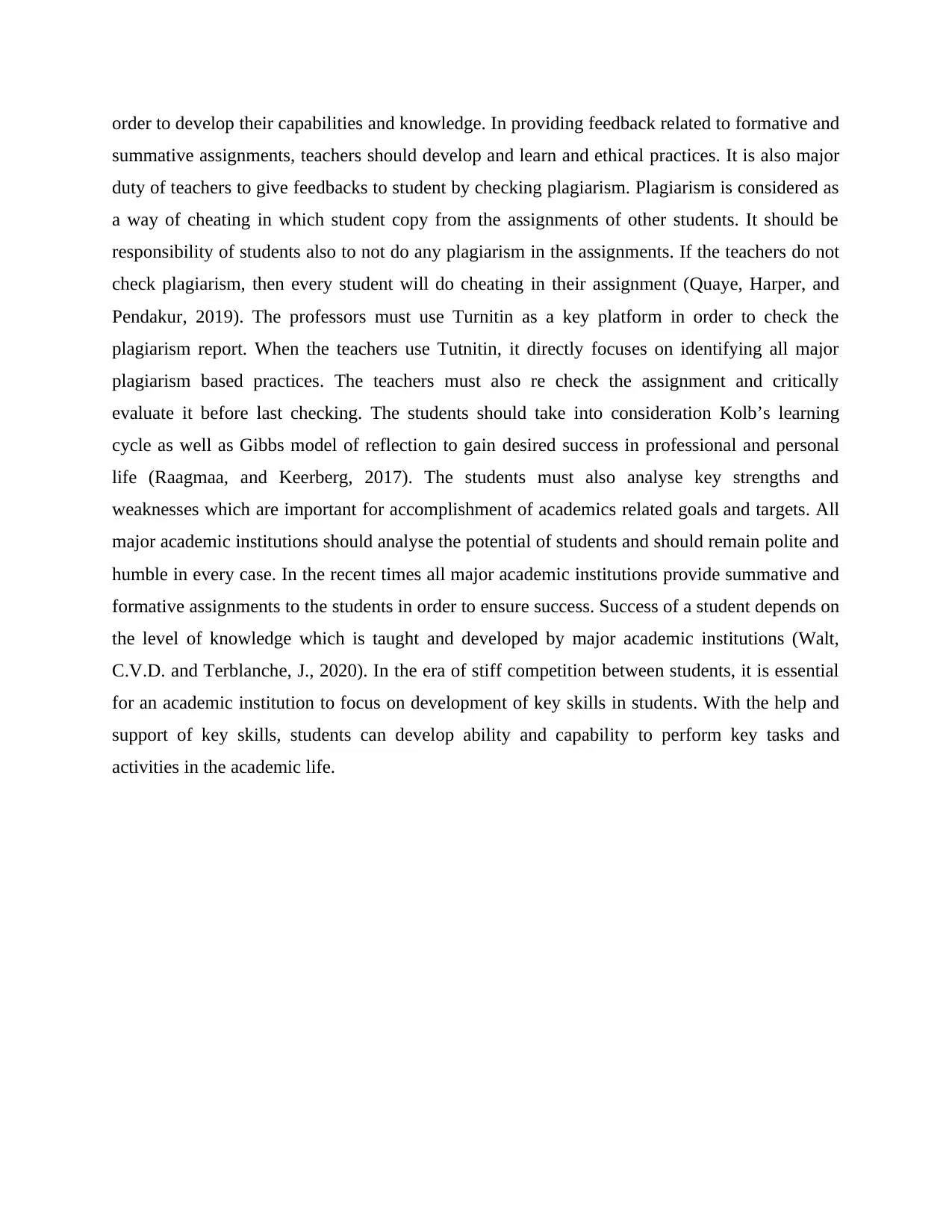
order to develop their capabilities and knowledge. In providing feedback related to formative and
summative assignments, teachers should develop and learn and ethical practices. It is also major
duty of teachers to give feedbacks to student by checking plagiarism. Plagiarism is considered as
a way of cheating in which student copy from the assignments of other students. It should be
responsibility of students also to not do any plagiarism in the assignments. If the teachers do not
check plagiarism, then every student will do cheating in their assignment (Quaye, Harper, and
Pendakur, 2019). The professors must use Turnitin as a key platform in order to check the
plagiarism report. When the teachers use Tutnitin, it directly focuses on identifying all major
plagiarism based practices. The teachers must also re check the assignment and critically
evaluate it before last checking. The students should take into consideration Kolb’s learning
cycle as well as Gibbs model of reflection to gain desired success in professional and personal
life (Raagmaa, and Keerberg, 2017). The students must also analyse key strengths and
weaknesses which are important for accomplishment of academics related goals and targets. All
major academic institutions should analyse the potential of students and should remain polite and
humble in every case. In the recent times all major academic institutions provide summative and
formative assignments to the students in order to ensure success. Success of a student depends on
the level of knowledge which is taught and developed by major academic institutions (Walt,
C.V.D. and Terblanche, J., 2020). In the era of stiff competition between students, it is essential
for an academic institution to focus on development of key skills in students. With the help and
support of key skills, students can develop ability and capability to perform key tasks and
activities in the academic life.
summative assignments, teachers should develop and learn and ethical practices. It is also major
duty of teachers to give feedbacks to student by checking plagiarism. Plagiarism is considered as
a way of cheating in which student copy from the assignments of other students. It should be
responsibility of students also to not do any plagiarism in the assignments. If the teachers do not
check plagiarism, then every student will do cheating in their assignment (Quaye, Harper, and
Pendakur, 2019). The professors must use Turnitin as a key platform in order to check the
plagiarism report. When the teachers use Tutnitin, it directly focuses on identifying all major
plagiarism based practices. The teachers must also re check the assignment and critically
evaluate it before last checking. The students should take into consideration Kolb’s learning
cycle as well as Gibbs model of reflection to gain desired success in professional and personal
life (Raagmaa, and Keerberg, 2017). The students must also analyse key strengths and
weaknesses which are important for accomplishment of academics related goals and targets. All
major academic institutions should analyse the potential of students and should remain polite and
humble in every case. In the recent times all major academic institutions provide summative and
formative assignments to the students in order to ensure success. Success of a student depends on
the level of knowledge which is taught and developed by major academic institutions (Walt,
C.V.D. and Terblanche, J., 2020). In the era of stiff competition between students, it is essential
for an academic institution to focus on development of key skills in students. With the help and
support of key skills, students can develop ability and capability to perform key tasks and
activities in the academic life.
⊘ This is a preview!⊘
Do you want full access?
Subscribe today to unlock all pages.

Trusted by 1+ million students worldwide
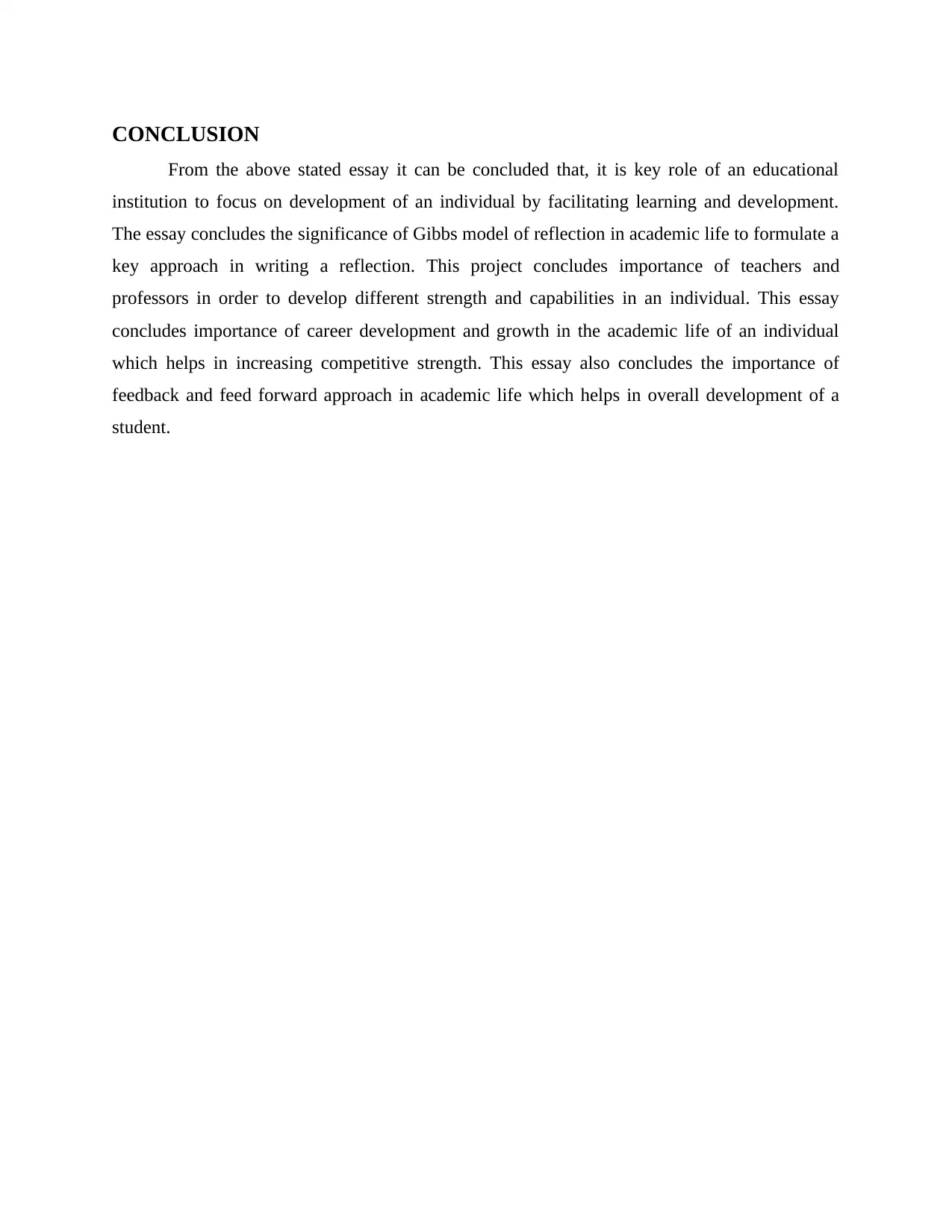
CONCLUSION
From the above stated essay it can be concluded that, it is key role of an educational
institution to focus on development of an individual by facilitating learning and development.
The essay concludes the significance of Gibbs model of reflection in academic life to formulate a
key approach in writing a reflection. This project concludes importance of teachers and
professors in order to develop different strength and capabilities in an individual. This essay
concludes importance of career development and growth in the academic life of an individual
which helps in increasing competitive strength. This essay also concludes the importance of
feedback and feed forward approach in academic life which helps in overall development of a
student.
From the above stated essay it can be concluded that, it is key role of an educational
institution to focus on development of an individual by facilitating learning and development.
The essay concludes the significance of Gibbs model of reflection in academic life to formulate a
key approach in writing a reflection. This project concludes importance of teachers and
professors in order to develop different strength and capabilities in an individual. This essay
concludes importance of career development and growth in the academic life of an individual
which helps in increasing competitive strength. This essay also concludes the importance of
feedback and feed forward approach in academic life which helps in overall development of a
student.
Paraphrase This Document
Need a fresh take? Get an instant paraphrase of this document with our AI Paraphraser
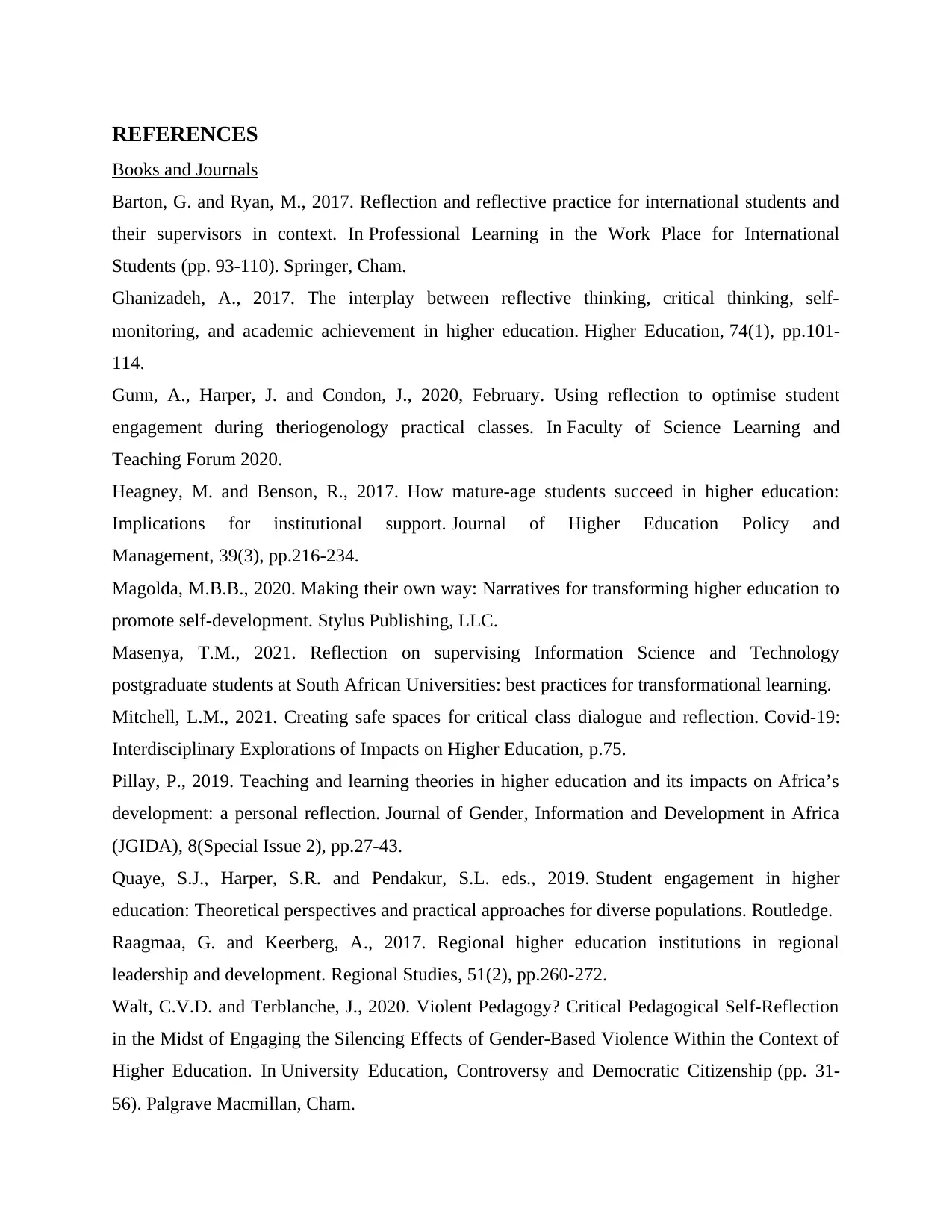
REFERENCES
Books and Journals
Barton, G. and Ryan, M., 2017. Reflection and reflective practice for international students and
their supervisors in context. In Professional Learning in the Work Place for International
Students (pp. 93-110). Springer, Cham.
Ghanizadeh, A., 2017. The interplay between reflective thinking, critical thinking, self-
monitoring, and academic achievement in higher education. Higher Education, 74(1), pp.101-
114.
Gunn, A., Harper, J. and Condon, J., 2020, February. Using reflection to optimise student
engagement during theriogenology practical classes. In Faculty of Science Learning and
Teaching Forum 2020.
Heagney, M. and Benson, R., 2017. How mature-age students succeed in higher education:
Implications for institutional support. Journal of Higher Education Policy and
Management, 39(3), pp.216-234.
Magolda, M.B.B., 2020. Making their own way: Narratives for transforming higher education to
promote self-development. Stylus Publishing, LLC.
Masenya, T.M., 2021. Reflection on supervising Information Science and Technology
postgraduate students at South African Universities: best practices for transformational learning.
Mitchell, L.M., 2021. Creating safe spaces for critical class dialogue and reflection. Covid-19:
Interdisciplinary Explorations of Impacts on Higher Education, p.75.
Pillay, P., 2019. Teaching and learning theories in higher education and its impacts on Africa’s
development: a personal reflection. Journal of Gender, Information and Development in Africa
(JGIDA), 8(Special Issue 2), pp.27-43.
Quaye, S.J., Harper, S.R. and Pendakur, S.L. eds., 2019. Student engagement in higher
education: Theoretical perspectives and practical approaches for diverse populations. Routledge.
Raagmaa, G. and Keerberg, A., 2017. Regional higher education institutions in regional
leadership and development. Regional Studies, 51(2), pp.260-272.
Walt, C.V.D. and Terblanche, J., 2020. Violent Pedagogy? Critical Pedagogical Self-Reflection
in the Midst of Engaging the Silencing Effects of Gender-Based Violence Within the Context of
Higher Education. In University Education, Controversy and Democratic Citizenship (pp. 31-
56). Palgrave Macmillan, Cham.
Books and Journals
Barton, G. and Ryan, M., 2017. Reflection and reflective practice for international students and
their supervisors in context. In Professional Learning in the Work Place for International
Students (pp. 93-110). Springer, Cham.
Ghanizadeh, A., 2017. The interplay between reflective thinking, critical thinking, self-
monitoring, and academic achievement in higher education. Higher Education, 74(1), pp.101-
114.
Gunn, A., Harper, J. and Condon, J., 2020, February. Using reflection to optimise student
engagement during theriogenology practical classes. In Faculty of Science Learning and
Teaching Forum 2020.
Heagney, M. and Benson, R., 2017. How mature-age students succeed in higher education:
Implications for institutional support. Journal of Higher Education Policy and
Management, 39(3), pp.216-234.
Magolda, M.B.B., 2020. Making their own way: Narratives for transforming higher education to
promote self-development. Stylus Publishing, LLC.
Masenya, T.M., 2021. Reflection on supervising Information Science and Technology
postgraduate students at South African Universities: best practices for transformational learning.
Mitchell, L.M., 2021. Creating safe spaces for critical class dialogue and reflection. Covid-19:
Interdisciplinary Explorations of Impacts on Higher Education, p.75.
Pillay, P., 2019. Teaching and learning theories in higher education and its impacts on Africa’s
development: a personal reflection. Journal of Gender, Information and Development in Africa
(JGIDA), 8(Special Issue 2), pp.27-43.
Quaye, S.J., Harper, S.R. and Pendakur, S.L. eds., 2019. Student engagement in higher
education: Theoretical perspectives and practical approaches for diverse populations. Routledge.
Raagmaa, G. and Keerberg, A., 2017. Regional higher education institutions in regional
leadership and development. Regional Studies, 51(2), pp.260-272.
Walt, C.V.D. and Terblanche, J., 2020. Violent Pedagogy? Critical Pedagogical Self-Reflection
in the Midst of Engaging the Silencing Effects of Gender-Based Violence Within the Context of
Higher Education. In University Education, Controversy and Democratic Citizenship (pp. 31-
56). Palgrave Macmillan, Cham.

⊘ This is a preview!⊘
Do you want full access?
Subscribe today to unlock all pages.

Trusted by 1+ million students worldwide

Paraphrase This Document
Need a fresh take? Get an instant paraphrase of this document with our AI Paraphraser

1 out of 11
Related Documents
Your All-in-One AI-Powered Toolkit for Academic Success.
+13062052269
info@desklib.com
Available 24*7 on WhatsApp / Email
![[object Object]](/_next/static/media/star-bottom.7253800d.svg)
Unlock your academic potential
Copyright © 2020–2026 A2Z Services. All Rights Reserved. Developed and managed by ZUCOL.



